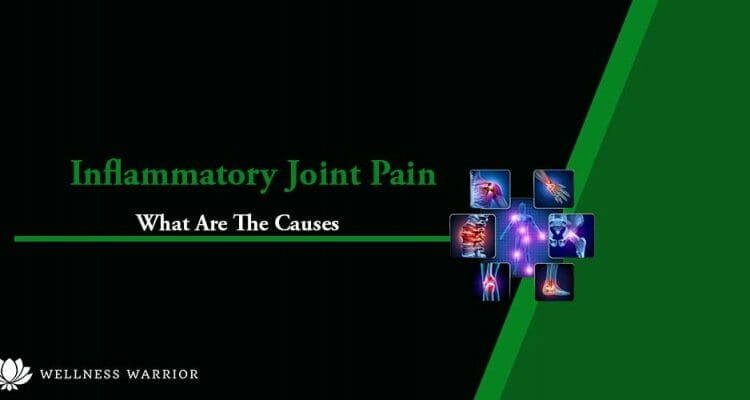You can’t see inflammation in your body, but it can certainly be felt in the body [1].
It can slowly but surely damage your body.
You will know you have inflammation in the body if you notice redness or swelling.
Your joints will be painful and stiff, and they won’t work properly.
In fact, inflammation and the accompanying swelling are actually part of the body’s natural ability to heal itself [2].
The body will fight off injury and infection.
It is your immune system going into action even if you haven’t been injured or suffered from an infection.
There might not be any healing needed like if you are infected or injured.
But the immune system, in trying to protect itself, can even start to destroy healthy joints, organs, and arteries.
Inflammation occurs when tissues of the body get injured by toxins, trauma, heat, bacteria, or any other cause [3].
There are different types of inflammation
You will find that there are two types of inflammation. One is acute inflammation, and the other is chronic inflammation.
Acute inflammation is the ‘good’ type of inflammation because it helps the body heal.
Chronic inflammation is the ‘bad’ type of inflammation because it is associated with chronic diseases as well.
Research has shown that chronic inflammation is involved in quite a few health conditions.
These could be arthritis, type 2 diabetes, heart disease, cancer, and Alzheimer’s disease [4].
Both acute and chronic inflammation will show different symptoms, causes, and purposes.
How inflammation occurs
If you don’t get plenty of exercise, eat healthily, and have a lot of stress in your life, then the body will respond by triggering inflammation.
Chronic inflammation can really cause damage to your body over the long term.
The food you eat, the quality of your sleep, how much exercise you get, and controlling stress – all will help in reducing inflammation in the body.
Basically, inflammation is your body responding to anything it sees as an irritant to the body.
The irritant can be a germ or something like getting a splinter in your finger.
Inflammation already starts when the body is trying to fight that harmful irritation.
Ongoing inflammation and what it does to the body
There are early subtle signs that can even go undetected for a long time when you have inflammation.
You might have noticed that you are tired lately.
As the inflammation progresses, it slowly starts to damage your joints, organs, and arteries. If it is ignored, it can start to contribute to chronic diseases like heart disease, Alzheimer’s, blood vessel disease, diabetes, cancer, obesity, and other conditions.
The cells of the immune system that cause inflammation contribute to the build-up of fatty deposits in the lining of the heart’s arteries. This can lead to things like a heart attack [5].
How do you measure inflammation?
You will undergo a blood test for C-reactive protein (hs-CRP).
This will reveal whether you have inflammation or not. The doctor will take your homocysteine levels.
Physicians will test for your blood sugar to assess if there is any damage to the red blood cells.
What causes me to get inflammatory joint pain – how does it start?
Most inflammatory diseases actually start in the gut.
A reaction is set off by the immune system that something is not 100% right.
This is what starts the inflammatory response. The gut consists of a semi-permeable coating that is vast and intricate [6]. The permeability will change as it responds to different chemical conditions.
If your stress in the body is raised because you are involved in a serious argument, for example, or trauma or if you continue to eat inflammatory foods like trans-fats and sugars, the intestine walls become more damaged.
Bad posture, tense feelings, and negative thoughts are ideal breeding grounds for inflammation.
When the intestine walls that we mentioned above get damaged over and over again by stress, bad nutrition, conflict, irregular emotions, etc., then the cells in the gut aren’t able to carry out their job correctly.
Your digestion becomes highly compromised.
The top priority is to reduce chronic inflammation
It is possible to control and even reverse your inflammation.
You can do it if you are prepared to follow a healthy anti-inflammatory diet and live an anti-inflammatory lifestyle.
Look at these amazing foods that can clear inflammation for you!
Lots of factors contribute to chronic inflammation. It could be your genetic predisposition, sleeping patterns, and diet. Even unknown food allergies can cause inflammation in your intestine.
What Causes Joint Inflammation? Symptoms, Diagnosis, And Treatment

Researchers say they have identified the typical common causes of inflammation of the body.
Inflammation has a lot to do with modern lifestyles and aging. Let’s look at the causes:
1) Being physically inactive
An anti-inflammatory chemical process will occur in your bloodstream when you start exercising.
When people don’t meet the minimum activity requirements and recommendations for optimal health, they increase their risk of age-related diseases.
2) Being overweight
Visceral fat which is that deep layer of fat that surrounds the abdominal organs produces inflammatory chemicals.
3) Diet
If your diet is high in trans-fat, saturated fat, and refined sugar, and you buy a lot of takeaways and processed foods, you can expect to experience increased inflammation. It becomes worse in overweight people.
4) Smoking
Smoking cigarettes increases inflammation, simply because it lowers the production of anti-inflammatory molecules.
5) Low sex hormones
The top sex hormones like testosterone and estrogen suppress inflammation.
When there are lower levels of these hormones, it increases the risk of inflammatory diseases.
6) Stress
All kinds of stress are associated with increased inflammation in the body.
7) Insufficient sleep
Those with irregular sleeping schedules develop more inflammation than people who get plenty of good quality sleep.
8) Age
Research will show you that as you age, inflammation in the body deteriorates.
In fact, a study of over 20,000 seniors found that those who participated in weekly activity had lower risks of developing Alzheimer’s compared to their counterparts who weren’t active.
How do I recognize inflammation in my body?
1) You feel tired most of the time
Having too little sleep and even too much sleep can cause inflammation. Your cells start to respond to irregular sleep patterns as if it is fighting an illness.
2) You always seem to have aches and pains
Experiencing pain regularly that is not caused by an injury is a sign that there is inflammation in your body.
You could also have started to develop arthritis.
3) You’ve got digestive issues
Ongoing symptoms such as gassiness and diarrhea are signs of chronic inflammation.
The inflammation can cause you to suffer from cramps and bloating.
4) Your lymph nodes are swollen
You will find the lymph nodes near the armpits, neck, and groin.
If your lymph nodes feel swollen, it is no doubt a sign that not all is right with your immune system.
Sometimes when your throat is sore or you have a cold, you might notice this swelling in your neck.
Your immune system starts to work toward getting rid of the viral or bacterial infection.
5) Your nose is stuffy
When your body is not up to par health-wise, it will often let you know with inflamed nasal cavities.
Your nose will feel stuffy and you might think you are starting a cold or you have allergies.
Because inflammation is the way the body fights off foreign substances and protects itself, a stuffy nose could be a sign of something else even.
6) Your skin acts up
Internal inflammation can often show up in the skin, be it through a rash, dry skin, acne, or eczema.
7) You struggle with brain fog
Inflammation can also affect you mentally [7].
You might find you are forgetting things more than you usually do.
Or you are having trouble focusing.
8) You have heartburn
If you experience heartburn, it’s another symptom that you probably have too much inflammation in the body.
Studies have shown that gastric reflux is often more related to inflammation than being from stomach acids traveling up the esophagus.
9) You keep getting headaches
No one is 100% sure what the causes of ongoing headaches and migraines are, but they could be a result of neurogenic inflammation; a type of inflammation in the brain.
Excellent ways to reduce inflammation in your body
- Take plenty of anti-inflammatory foods: The Mediterranean diet is an ideal example of an anti-inflammatory diet.
- Cut back or eliminate inflammatory foods
- Control blood sugar
- Make time to exercise
- Lose weight
- Manage stress
Conclusion
Most of us, when we think of inflammation in the body, think of injuries we have sustained or you have arthritis. You might not have realized it, but inflammation can also signal other health issues.
If your body has a lot of inflammation, your body will be trying to signal to you in various ways that not all is right in your system.
There will be times when you feel it is necessary to tell your doctor about some of the symptoms that you might be experiencing. But they could be caused by other things other than inflammation.
Remember, too, that not all inflammation is harmful to the body.
Your joints connect to your bones to allow you the wonderful movement you might be used to.
But like our bones, our joints are going to start to wear down as they age and cause conditions that affect our joints.
By the time we are old, sometimes our joints can be so well worn down that just simple movements can be extremely painful.
Remember this, you might be getting older, but it is never too late to make some of the lifestyle changes we have mentioned above to really improve your quality of life and health.
Actually, the best way you can care for your joints is by keeping the muscles, bones, and ligaments resilient, and of course, free from inflammation.
References
- [1] https://www.medicalnewstoday.com/articles/
- [2] https://www.webmd.com/arthritis/about-inflammation
- [3] https://medlineplus.gov/ency/article/000821.htm#:~:text=The%20inflammatory%20response%20(inflammation)%20occurs,into%20the%20tissues%2C%20causing%20swelling.
- [4] https://www.ncbi.nlm.nih.gov/books/NBK493173/
- [5] https://www.heart.org/en/health-topics/consumer-healthcare/what-is-cardiovascular-disease/inflammation-and-heart-disease
- [6] https://www.ncbi.nlm.nih.gov/pmc/articles/PMC4372027/
- [7] https://www.ncbi.nlm.nih.gov/pmc/articles/PMC6658985/
